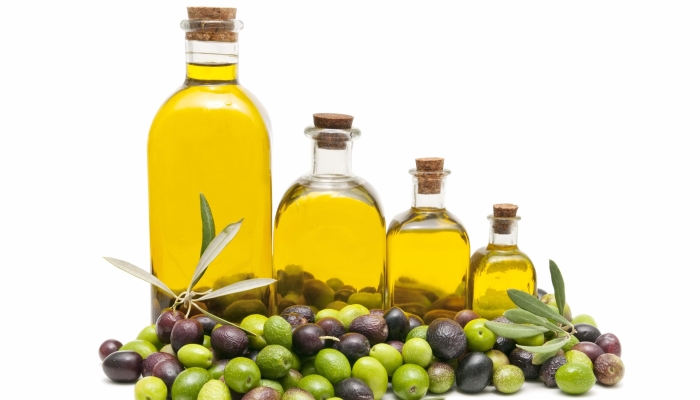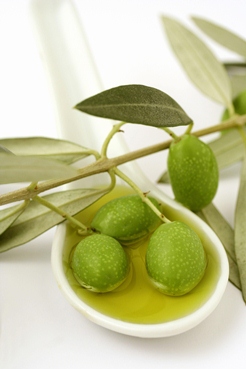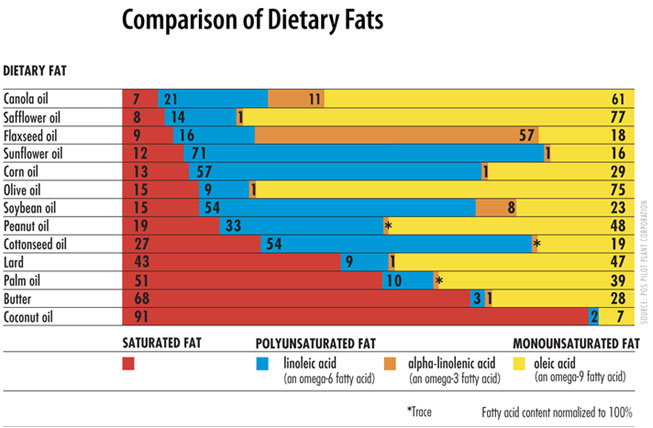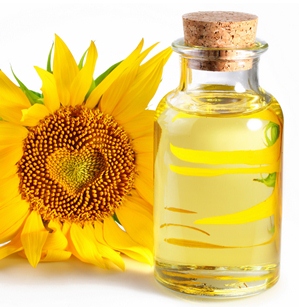
Fat is an important part of a healthy diet. However some fats are better than others. Saturated fats increase blood cholesterol.Mono-unsaturated and polyunsaturated fats tend to lower blood cholesterol. Trans fatty acids (or trans fats) are also potentially harmful and are used to make baked products, pies, cakes, biscuits and buns. Omega-6 and omega-3 fats can benefit your health.
Fats and oils are essential elements in any healthful diet. Fats do more than supply some important nutrients. They also make foods feel and taste rich and satisfying. They signal the stomach that enough food has been eaten, giving people the feeling of satiety that encourages them to stop eating before they overeat. Fats are found in some foods, notably meats, poultry, fish, cheeses, eggs, and nuts. The type of fats a food contains may be monounsaturated, polyunsaturated, or saturated. Each appears to have a different effect on the body.
Monounsaturated Fats
When findings about the Mediterranean diet were released, it seemed clear that the use of olive oil in those diets played a role in a generally lower incidence of cardiovascular disease. Monounsaturated fats have a tendency to lower the levels of certain types of cholesterol in the blood and raise others. The net result of this is that diets that rely upon monounsaturated fats, rather than saturated fats, are likely to encourage low levels of serum cholesterol. This means that the chances of developing atherosclerosis are reduced. Nuts and olives, as well as oils made from those foods, contain primarily monounsaturated oils.
Polyunsaturated Fats
Oils made from corn, safflower, and rapeseed (canola), and other vegetable sources are referred to as polyunsaturated. While these oils are still preferred over saturated fats in a healthful diet, they do not appear to have precisely the same benefits as monounsaturated fats. Vegetable oils are frequently used to prepare shortening and margarine. This process, known as hydrogenation, changes the overall structure of the fat. Instead of pouring at room temperature, these hydrogenated oils become "plastic", or solid at room temperature.
Saturated Fats
Saturated fats are found typically in animal foods including butter, marbling in meats, lard, chicken skin, bacon, sausages and eggs. The so called "tropical oils" are also saturated fats. Examples like coconut and palm oils. Saturated fats have been linked to increase levels of serum cholesterol and an increased risk of developing cardio-vascular diseases.
Cholesterol
This is a type of fatty acid found in animal foods. There is a distinction between dietary cholesterol and serum cholesterol. Dietary cholesterol is that which is found in the foods themselves. Serum cholesterol is found in your bloodstream. When you have a blood test done to determine your personal cholesterol levels, the doctor will review specific components found in the blood, known as lipoproteins. Low-density lipoproteins (LDL) are associated with an increased risk of developing arteriosclerosis. High-density lipoproteins (HDL) appear to reduce the risk, since HDL actually removes LDL from your blood.
Certain individuals are more sensitive to dietary cholesterol than others. Learning how to reduce the amount of foods containing cholesterol in your diet is critical if you are one of those individuals. But, it may not always be enough. Your body produces cholesterol on its own, whether or not you eat foods containing it. Plant-based foods, even those high in fats and oils, do not contain cholesterol. This means that peanut butter, almonds, olives, beans and sesame seeds are all "cholesterol free".
Good Fats & Bad Fats Fat is an important part of a healthy diet. There's more and more evidence that many fats are good for us and actually reduce the risk of heart attack and stroke. They also help our sugar and insulin metabolism and therefore contribute to our goals of long-term weight loss and weight maintenance. And because good fats make foods taste better, they help us enjoy the journey to a healthier lifestyle. But not all fats are created equal--there are good fats and bad fats.
Fat is an important part of a healthy diet. There's more and more evidence that many fats are good for us and actually reduce the risk of heart attack and stroke. They also help our sugar and insulin metabolism and therefore contribute to our goals of long-term weight loss and weight maintenance. And because good fats make foods taste better, they help us enjoy the journey to a healthier lifestyle. But not all fats are created equal--there are good fats and bad fats.
Animal fats have a bad reputation, but many professionals believe it is not animal fat, but the combination of animal foods, fats and low-fibre vegetables that is the problem. Also, because of horrible factory farming methods, antibiotics and steroid use, fats from non-organically raised, non-free-range animals should probably be used with prudence. Among the worst of the 'bad' fats are margarine and the fats found in anything fried. And if you see 'partially hydrogenated' on any food label, avoid it like the plague. Refined vegetable oils are also on the 'bad' fats list. These oils oxidise easily and have been processed with high heat, which removes all the healthy nutrients, like Vitamin E. Extra virgin cold-pressed olive oil, however, is a 'good' fat.
Good Fat
Good fats are contained in natural non-animal products, these fats are excellent for promoting good health and vital performance.
Omega 6 fatty acids are easier to come by than the omega 3 type.
You can find omega 6 fats in such foods as avocado, nuts, olives and seeds.
Good fat can can help your metabolism run efficiently and by consuming adequate amounts, you can actually assist in weight loss. Fat won't make you fat.
"Good" fats include monounsaturated fats, found in olive and canola oils, peanuts and other nuts, peanut butter, and avocados. Monounsaturated fats lower total and "bad" LDL cholesterol - which accumulates in and clogs artery walls--while maintaining levels of "good" HDL cholesterol, which carries cholesterol from artery walls and delivers it to the liver for disposal.
Omega-3 fatty acids - polyunsaturated fats found in coldwater fish, canola oil, flaxseeds, walnuts, almonds, and macadamia nuts--also count as good fat. Recent studies have shown that populations that eat more omega-3s, such as Eskimos (whose diets are heavy on fish), have fewer serious health problems such as heart disease and diabetes. There is evidence that omega-3 oils help prevent or treat depression, arthritis, asthma, and colitis and help prevent cardiovascular deaths. You'll eat both monounsaturated fats and omega-3s in abundance in all three phases of the diet.
Bad Fats
Bad fats are dangerous and to be fair, should be avoided. Trans and Saturated fats can create health problems including heart disease, weight gain, excess insulin secretion and impaired bodily function. Knowing what fats you should avoid can help you maintain good health and negate the ill effects of the bad types of fat.
weight gain, excess insulin secretion and impaired bodily function. Knowing what fats you should avoid can help you maintain good health and negate the ill effects of the bad types of fat.
"Bad" fats include saturated fats - the heart-clogging kind found in butter, fatty red meats, and full-fat dairy products. "Very bad" fats are the manmade trans fats. Trans fats, which are created when hydrogen gas reacts with oil, are found in many packaged foods, including margarine, cookies, cakes, cake icings, doughnuts, and potato chips. Trans fats are worse than saturated fats; they are bad for our blood vessels, nervous systems, and waistline.
The most popular offenders are animal fats (except fish), which are all saturated. These include the fat from beef, chicken, pork and lamb. These meats are perfectly healthy - when lean, but if the fat isn't trimmed then you may consume a large amount of saturated fat.
Also in the bad fat category are cream, butter and any dairy products containing milk fat. Often people are advised to avoid dairy when dieting, but this is a bit of a misnomer as low fat dairy is completely fine and healthy.
Two non-animal fat products that are commonly used but not commonly known as saturated in fat type are palm oil and coconuts. These two naturally occurring non-animal products contain high levels of saturated fat and are considered not to be healthy. Watch for foods containing palmolein, which is palm oil.
Best oil for cooking
Like butter and margarine, oils used in cooking, baking, and salad dressings can blow your fat budget in a hurry. Many people are confused about oils because liquid vegetable oils have long been promoted as being "heart healthy." The reason? These oils are low in artery-clogging saturated fat, and contain no cholesterol. Unfortunately, many people also assume that these products are low in total fat and calories, and therefore may be used liberally. Not so. The fact is that all oils are pure fat. Just one tablespoon of any oil has 13.6 grams of fat and 120 calories. However, for those times when you do need a little oil for cooking, be aware that some oils are more useful than others in light and healthy cooking.
We shall need to consider what is the best cooking method for the oil we use. For example, we all have known that olive oil is very good to health, but due to its smoke point is very low then it is actually not suitable for deep-frying. This is because the oil will begin to break down and become unstable if the temperature exceeds its smoke point. It will not only create a harsh smell and smoke, but also believe that if the fats have passed its smoke point level, it will contain large quantity of free radicals which contribute to risk of cancer.
Offhand we may easily spell out many types of cooking oil available in the market, thus I may only bring some examples that are commonly used and hope they are informative to everyone.

Canola Oil
Low in saturated fats and rich in monounsaturated fats, canola oil also contains alpha-linolenic acid, an essential omega-3 fat that is deficient in most people's diets. For these reasons, canola oil should be one of your primary cooking oils. Canola oil has a very mild, bland taste, so it is a good all-purpose oil for cooking and baking when you want no interfering flavors.
Carotino Red Palm Oil
Another new type of oil derived from fruit of red palm tree. Essentials are it does not contain trans fat (bad fat) and has lesser saturated fat (bad fat). Contrary, it has high Vitamin A & E and beta-carotene (when these 2 are combined, it will act as abtioxidants and destroying free radicals and in turn, become an protective agent against cancer). Also, it contains Omega 3 & 6 fatty acids and lycopenen (another type of antioxidant). It also has been known as the cooking oil that can withstand high heat and temperature.
Coconut Oil
Coconut oil is a surprisingly controversial topic. It is not often available at the supermarkets, but it can be found at health food stores, and ordered online. The proponents of coconut oil believe that it helps prevent heart disease, and can support immune system health. Detractors, including the FDA, note that it contains high levels of trans fats, which are very bad for you. The smoke point of coconut oil is 350 degrees F.
Corn Oil
Corn oil contains beneficial unsaturated fat. However, even though the manufacturers of corn oil claim that it reduces your heart disease risk, they have not been able to provide solid scientific evidence to back this up. So these claims should be treated with extreme skepticism. The smoke point of corn oil is 450 degrees F.
Extra Virgin Olive Oil
Along with canola oil, olive oil should be one of your primary cooking oils. Rich in monounsaturated fat, olive oil also contains phytochemicals that may help lower blood cholesterol levels and protect against cancer. Unlike most vegetable oils, which are very bland, olive oil adds its own delicious flavor to foods. Extra virgin olive oil is the least processed and most flavorful type of olive oil. And a little bit goes a long way, making this product a good choice for use in low-fat recipes. What about "light" olive oil? In this case, light refers to flavor, which is mild and bland compared with that of other olive oils. This means that you have to use more oil for the same amount of flavor — not a good bargain.
Flax seed oil
is also known as linseed oil. it contains high level of omega 3 fatty acids including the fresh flaxseed oil In fact, it It contains the highest level of omega 3 fatty acids among all vegetable oils". It is said to be good for the heart atherosclerosis, plus it is crucial for infants development.
In addition, flaxseeds are a rich source of lignans, substances that appear to positively affect hormone-related problems. Lignans may also be useful in preventing certain cancers and combating specific bacteria, fungi, and viruses, including those that cause cold sores and shingles.
Macadamia Nut Oil
This oil has a delicious, light macadamia nut flavor, making it especially complementary to fish, chicken, vegetables, baked goods, and salads. Its high smoking point also makes macadamia nut oil ideal for stir-frying and sautéing. Like olive oil, macadamia nut oil is highly monounsaturated. Look for macadamia nut oil in health food and specialty stores.
Peanut Oil
Very commonly used in India and Asian countries. Fact is it contains heart-friendly MUFA that can lower the bad cholesterol level in our body without lower down the good cholesterol. It is advised to look for refined peanut oil instead of filtered oil because the filtered often contains toxic compound or adulterants. Basically it is suitable for all types of cooking – grilling, frying etc.
Ricebran Oil
A new type of oil extracted from ricebran and is gaining popularity in Asian countries like Japan, Korean, China and India. The essentials of ricebran oil are it rich with MUFA and contains natural Vitamin E. It also contains squalene, which is good for skin. So far it has been known as healthy cooking oil because of its nutritional quality and very stable even for deep-frying.
Safflower Oil
Safflower oil is high in vitamin E, which is good for you. However, it is also high in polyunsaturated fat and in omega 6 fatty acids. American diets tend to be too high in omega 6 fatty acids, so most people will want to reduce their intake of omega 6 and increase their intake of omega 3. The smoke point of refined safflower oil is 450 degrees F.
Sesame Oil
Sesame oil has a rich, nutty flavor that enhances the flavors of many foods. And when used in small amounts, this ingredient will add a distinctive taste to recipes without blowing your fat budget. Use toasted (dark) sesame oil for the most flavor. It rich in both MUFA & PUFA and low in saturated fats. It others essentials are sesame oil contains 2 unique chemicals called sesamol and sesamin – another powerful antioxidants. Research and studies show that consumption of sesame oil can actually lower down blood pressure. Sesame oil is commonly used for dressing and favoring purpose but rarely used for deep-frying.
Soybean Oil
Most cooking oils that are simply labelled "vegetable oil" are made from soybean oil. Soybean oil is also used as an ingredient in many brands of margarine, mayonnaise, and salad dressing. This oil supplies a fair amount of omega-3 fat, though not as much as canola and walnut oils do. Like canola oil, soybean oil has a bland flavor that works well when you want to avoid adding any interfering flavors to your dish.
Sunflower Oil
A very common oil and available under many brand names. Unfortunately it contains high polyunsaturated fat acid (PUFA) which actually lower down both good and bad cholesterol. As such, it is suggested to used along with other oils (for example, use sunflower oil one day and red palm oil for another). Sunflower oil is as high in polyunsaturated fat as safflower oil. However, it does not contain the beneficial vitamin E that safflower oil does. It is also high in omega 6 fatty acids. It’s probably best to pass over the sunflower oil. The smoke point of sunflower oil is 440 degrees F.
Walnut Oil
With a delicate nutty flavor, walnut oil is an excellent choice for baking, cooking, and salad making. Most grocery stores sell as least one brand of walnut oil such as Lorvia California Walnut Oil. Like canola oil, walnut oil contains a substantial amount of omega-3 fats. Most brands of walnut oil have been only minimally processed and can turn rancid quickly, so once opened, they should be refrigerated.
Nonstick Vegetable Oil Cooking Spray
Available unflavored and in butter, olive oil, and garlic flavors, these products are pure fat. The advantage to using them is that the amount that comes out during a one-second spray is so small that it adds an insignificant amount of fat to a recipe. Nonstick cooking sprays are very useful to the low-fat cook, as they promote the browning of foods and prevent foods from sticking to pots and pans.
As long as you're using fats and oils sparingly in your cooking and preparation, it would be fine to use any one of the following "good" oils. All of the following oils are low in saturated fats and trans fats. Some have high concentration of monounsaturated fats such as olive oil. Choose corn oil, safflower oil, sunflower oil, soy oil or canola oil if you wish to fry foods as these oils have higher smoke point. It is best not to fry with olive oil as its smoke point is only about 190C/375F.
Butter & Ghee (Clarified Butter)
Made from milk fat and usually contains high proportion of saturated fats, a risk factor for developing heart disease when consumed in excess. It is advised to consumed less.
Good Cooking Oils:
canola oil
flax seed oil
peanut oil
olive oil
non-hydrogenated soft margarine
safflower oil
sunflower oil
soybean oil
corn oil
The following "bad" oils contain high percentage of trans fat or saturated fats. Some, such as coconut oil, even contain more saturated fats than animal products!
Bad Cooking Oils:
Vegetable shortening
Hard margarine
Butter
Palm oil
Palm kernel oil
Coconut oil
Conclusion
Most of us know by now that the main villains are saturated fats, found chiefly in meat and high-fat dairy products, and trans fats, found in
fried foods, cakes, crackers, and some margarines. They raise total cholesterol levels and gum up arteries. Unsaturated fats, which mostly come from plants and fish, are essential to good health.
But even the good fat/bad fat message is turning out to be more complicated than nutritionists once thought, as researchers explore the health effects of the many different kinds of fatty acids. With evidence emerging that healthy fats not only improve cholesterol and triglyceride levels but also reduce inflammation, fats are emerging as one of the hottest new functional foods.
The solution to understanding fats lies in knowing that most fat is good and the only danger is excess consumption of a few animal fats, but that doesn't mean we have to give up fat forever, on the contrary - We should make sure to include plenty of plant based fats on a regular basis in our diet.
In general it seems that:
1. Animal fat = bad
2. Plant based fat = good ( with the exception of coconut and palm oil)
![]()
Disclaimer: This website is for information purposes only. By providing the information contained herein we are not diagnosing, treating, curing, mitigating, or preventing any type of disease or medical condition. Before beginning any type of natural, integrative or conventional treatment regime, it is advisible to seek the advice of a licensed healthcare professional.
Top view
Health Men
19.08.2017
What Will Happen to Your Body if
Chicken eggs possess numerous beneficial properties and can be used
+ View04.07.2017
The Best Greens To Eat
We all know that greens are important to eat and top the list when we
+ View04.07.2017
Eat Daily For Clean Arteries
The other day my dad went to see his doctor. My dad was scheduled to
+ View29.12.2016
5 Foods You Should NEVER Eat On An
Since childhood, we’ve all been told to add as many fruits and
+ ViewHealth Women
19.08.2017
What Will Happen to Your Body if
Chicken eggs possess numerous beneficial properties and can be used in
+ View04.07.2017
The Best Greens To Eat
We all know that greens are important to eat and top the list when we
+ View04.07.2017
Eat Daily For Clean Arteries
The other day my dad went to see his doctor. My dad was scheduled to
+ View29.12.2016
5 Foods You Should NEVER Eat On An
Since childhood, we’ve all been told to add as many fruits and veggies as
+ View

































